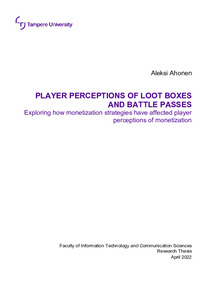Player Perceptions of Battle Passes and Loot Boxes: Exploring how monetization strategies have affected player perceptions of monetization
Ahonen, Aleksi (2022)
Ahonen, Aleksi
2022
Master's Programme in Game Studies
Informaatioteknologian ja viestinnän tiedekunta - Faculty of Information Technology and Communication Sciences
This publication is copyrighted. You may download, display and print it for Your own personal use. Commercial use is prohibited.
Hyväksymispäivämäärä
2022-05-23
Julkaisun pysyvä osoite on
https://urn.fi/URN:NBN:fi:tuni-202204273927
https://urn.fi/URN:NBN:fi:tuni-202204273927
Tiivistelmä
This paper explores the different player perceptions of battle passes and loot boxes in the video game industry. Appearing in different forms throughout the history of video games, the concept of generating revenue for games has been ever-changing. From the early stages of being a hobby and giving out free copies to entice players to possibly purchase the full edition, to the current stages of selling fractions of a full game through mystery boxes, we have seen immense changes in the different ways that companies attempt to generate money from their games. Player perceptions of loot boxes and battle passes have also changed due to the variety of ways games are monetized. Despite the popularity of many of these strategies, there are people who hold differing views than what could be considered as the mainstream belief, and research that attempts to investigate these perceptions are often focused on differing aims.
This thesis attempts to find these voices and to explore, analyze and understand how these loot boxes and battle passes are making people feel through qualitative and qualitative means of analysis. The work shows the broadness of opinions of what these monetization strategies are to people, how they interact with them and how it changes the way they feel about video games and video game companies. The main claims of this dissertation focus on the themes found within the thematic analysis. These themes help provide a holistic view of what this group of participants feel were the most relevant beliefs for current monetization strategies. Corporate Greed, Fairness, Meaningful Rewards and Exhaustion were the most prevalent themes. The results showed that the participants had negative beliefs and opinions about the current status quo of monetization strategies due to the problems that they bring with them. Loot boxes and battle passes, while effective, can be damaging to the game experience by creating an artificial paywall for content. While there are people who appreciate these inclusions, they often come at a cost. In this case, this cost is the experience of the player.
The concept of monetization strategies are an integral part of the games industry and games. Companies require revenue to create games, and the current methods are extremely effective. The complaints seen within this group of participants are valid, but they only represent a small group that cannot be easily generalized to a larger number of players. But it is important to understand that these feelings and beliefs exist to be able to see the deeper impact of these monetization strategies.
This thesis attempts to find these voices and to explore, analyze and understand how these loot boxes and battle passes are making people feel through qualitative and qualitative means of analysis. The work shows the broadness of opinions of what these monetization strategies are to people, how they interact with them and how it changes the way they feel about video games and video game companies. The main claims of this dissertation focus on the themes found within the thematic analysis. These themes help provide a holistic view of what this group of participants feel were the most relevant beliefs for current monetization strategies. Corporate Greed, Fairness, Meaningful Rewards and Exhaustion were the most prevalent themes. The results showed that the participants had negative beliefs and opinions about the current status quo of monetization strategies due to the problems that they bring with them. Loot boxes and battle passes, while effective, can be damaging to the game experience by creating an artificial paywall for content. While there are people who appreciate these inclusions, they often come at a cost. In this case, this cost is the experience of the player.
The concept of monetization strategies are an integral part of the games industry and games. Companies require revenue to create games, and the current methods are extremely effective. The complaints seen within this group of participants are valid, but they only represent a small group that cannot be easily generalized to a larger number of players. But it is important to understand that these feelings and beliefs exist to be able to see the deeper impact of these monetization strategies.
